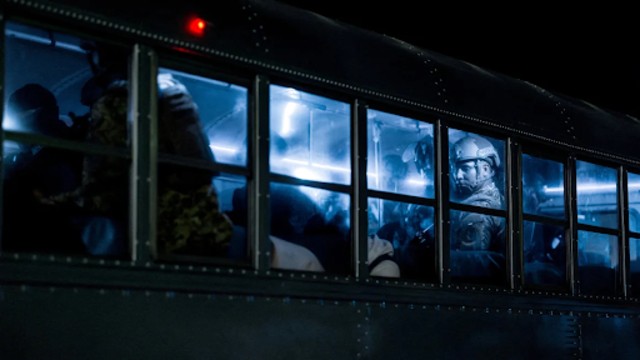
Salvadoran police escort suspected members of the Venezuelan Tren de Aragua gang, recently deported by the U.S., to the Cecot prison. This image was released by El Salvador’s Presidency Press Office on March 16. REUTERS
A group of lawyers is fighting to free 30 Venezuelans detained in El Salvador after being deported by the United States. On Monday, they asked the Salvadoran Supreme Court to review whether their imprisonment is legal. The lawyers were hired by the Venezuelan government led by Nicolás Maduro. They also want the court’s ruling to cover the remaining 238 Venezuelans deported under orders from U.S. President Donald Trump.
Jaime Ortega, one of the lawyers, explained that they are asking the court to examine the detainees’ legal status. He said if the detention is found to be illegal, the court should order their immediate release.
Last week, Salvadoran President Nayib Bukele claimed that the U.S. had deported 238 suspected members of the Tren de Aragua gang, a criminal organization. However, he did not reveal their identities or provide proof of their criminal ties. El Salvador accepted the deportees and placed them in the Terrorism Confinement Center (Cecot), the largest prison in Latin America. U.S. officials have confirmed that not all of the deported individuals had criminal records.
The Trump administration justified the deportations by using the Alien Enemies Act, which is normally reserved for wartime situations. This move is now under legal review in the U.S. courts.
The lawyers in El Salvador argued that since this is an immigration matter, the Supreme Court should order the Venezuelans’ return to their home country. However, the judges have no set deadline for deciding on the appeal.
Juan Pappier, Americas Deputy Director for Human Rights Watch, expressed doubts about the court's independence. He said it was unlikely that the court would challenge the Bukele administration’s actions. Pappier acknowledged the families’ desperation but warned that El Salvador’s court system lacks independence. He explained that it has been heavily influenced by Bukele’s government, making it unrealistic to expect a ruling in favor of the detainees.
Pappier also criticized the deportations, calling them a violation of international human rights. He argued that the U.S. had breached United Nations principles, which forbid countries from sending individuals to places where they may face torture or severe human rights violations.
Meanwhile, El Salvador’s National Commission on Human Rights and Freedom of Expression, a government agency, has offered support to the families of the detained Venezuelans. The agency said it had received seven petitions from families requesting their loved ones’ release.
Presidential commissioner Andrés Guzmán assured that the agency would investigate each case thoroughly. He said they would conduct the necessary verifications to determine whether the detainees’ rights were being respected.















